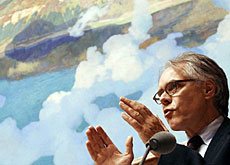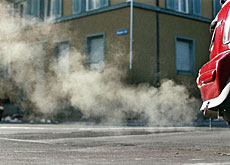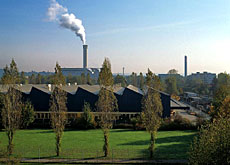Summit fails to progress on climate change

The World Climate Conference has drawn to a close in Buenos Aires without any agreement on how to replace the Kyoto protocol on greenhouse gases.
swissinfo spoke to Switzerland’s environment minister, Moritz Leuenberger, who warned that global warming could only be slowed with appropriate measures.
Leuenberger was one of 90 government ministers who attended the meeting in the Argentine capital where the European Union and the United States struggled to break a deadlock on Friday.
Washington resisted Europe’s interest in steps to fight global warming after the Kyoto pact ends in 2012.
The impasse may also thwart an agreement on climate aid for developing countries, who suffer the most from the rise in world temperatures linked to man-made emissions like carbon dioxide (CO2).
On Saturday delegates did, however, agree to hold an experts’ meeting in the former German capital, Bonn, next May to discuss possible options.
swissinfo: Mr Leuenberger, what are your conclusions after this conference?
Moritz Leuenberger: We are particularly concerned about climate change in Switzerland, since we are affected more than some countries. We see our glaciers melting away and, as a result, our tourism industry suffers.
The fact that there was a conference was positive, and we were able to discuss the Kyoto protocol, which comes into force in February.
But what should happen after it ends in 2012 has divided delegates at the meeting. The United States, the oil-producing nations and India say that negotiations on a second set of measures to cut greenhouse gases are premature.
I would rather give up on a new agreement than accept a bad compromise. At least then we would know where countries stand.
swissinfo: The International Energy Agency and the Swiss environment agency are concerned Switzerland will not meet its target of reducing greenhouse gases by eight per cent. Does Switzerland have to change its energy policy?
M.L.: We have a proposal to introduce a CO2 tax for transport, plus an additional levy on fuel. The government and parliament still have to decide whether to go ahead with this.
We are convinced we need a CO2 tax, but even with that we might not reach the target. We think that this will still be a big step forward, since it would be better than doing nothing.
swissinfo: Will the planned measures suffice?
M.L.: It should be enough for industry, but I’m not so sure about road traffic. We are trying to find the best compromise. I’m concerned some people will fight it, though. It will be my job as a politician to get my message across.
swissinfo: Switzerland believes that developing nations must be a party to any Kyoto successor. Were you able to get that message across?
M.L.: We were able to discuss it. We want nations that are big producers of greenhouse gases, not necessarily every developing country, to take part. Our estimates show that by 2015, developing nations will produce around half of all CO2, and that’s why they must be persuaded to sign up.
swissinfo: The Argentine president, Nestor Kirchner, complained that rich countries always demand that poorer nations pay their debts, but won’t pay for the damage they do to the environment. Do you feel this is fair?
M.L.: You can’t generalise, although in some cases it rings true.
Switzerland believes the United States is not ready to ratify the Kyoto protocol, but we could accept that if the Americans met the Kyoto targets without signing on. However, we haven’t seen or heard anything that would lead us to believe that. So criticising the United States, as Kirchner does, is justified.
swissinfo: You discussed new technologies to fight climate change at the conference. What does Switzerland have to offer?
M.L.: The 23 nations that took part in those discussions all agree that climate change is here to stay and that greenhouses gases are to blame. In Switzerland some people still have to come to terms with that. But in Buenos Aires, you could see there was a consensus.
Switzerland can highlight its transport policy: for example, the fact that vehicles can be taxed according to how much they pollute. Other countries are interested in how we operate and may follow our lead.
swissinfo-interview: Jean-Michel Berthoud
The meeting in Buenos Aires marked the tenth anniversary of the United Nations’ climate convention.
The Kyoto protocol on greenhouse gas emissions becomes effective in February.
Signatory states have pledged to reduce emissions by 5.2% from 1990 levels.
Switzerland and the EU have set themselves an 8% target.
Switzerland’s law on CO2 emissions, which was introduced in May 2000, is the cornerstone of its climate policy.
The law sets out targets for emission reductions that must be met, otherwise additional taxes or levies must be brought into play.
The legislation also allows Switzerland to meet its international obligations as a signatory of the UN climate convention.

In compliance with the JTI standards
More: SWI swissinfo.ch certified by the Journalism Trust Initiative











You can find an overview of ongoing debates with our journalists here . Please join us!
If you want to start a conversation about a topic raised in this article or want to report factual errors, email us at english@swissinfo.ch.